Contemporary Issues in Health and Social Care: A Comprehensive Report
VerifiedAdded on 2021/02/20
|11
|3848
|81
Report
AI Summary
This report delves into contemporary issues within health and social care, examining how information reaches the public and influences attitudes, thoughts, and behaviors. Task 1 explores various techniques for disseminating health-related information, including social media, medical campaigns, and the roles of different organizations and professionals. It also analyzes how the presentation of this information affects public perceptions. Task 2 examines different perspectives on specific health and social care issues, such as Alzheimer's disease, from service providers, regulatory bodies, and the media. It also explores how these perspectives have changed over time and their relevance to local health practices. The report highlights the influence of media in shaping public attitudes and behaviors, the importance of assessing the reliability of media information, and the potential consequences of contemporary thinking for health and social care provision. It concludes by emphasizing the dynamic nature of health perspectives and the impact of technological advancements on patient care and public understanding.
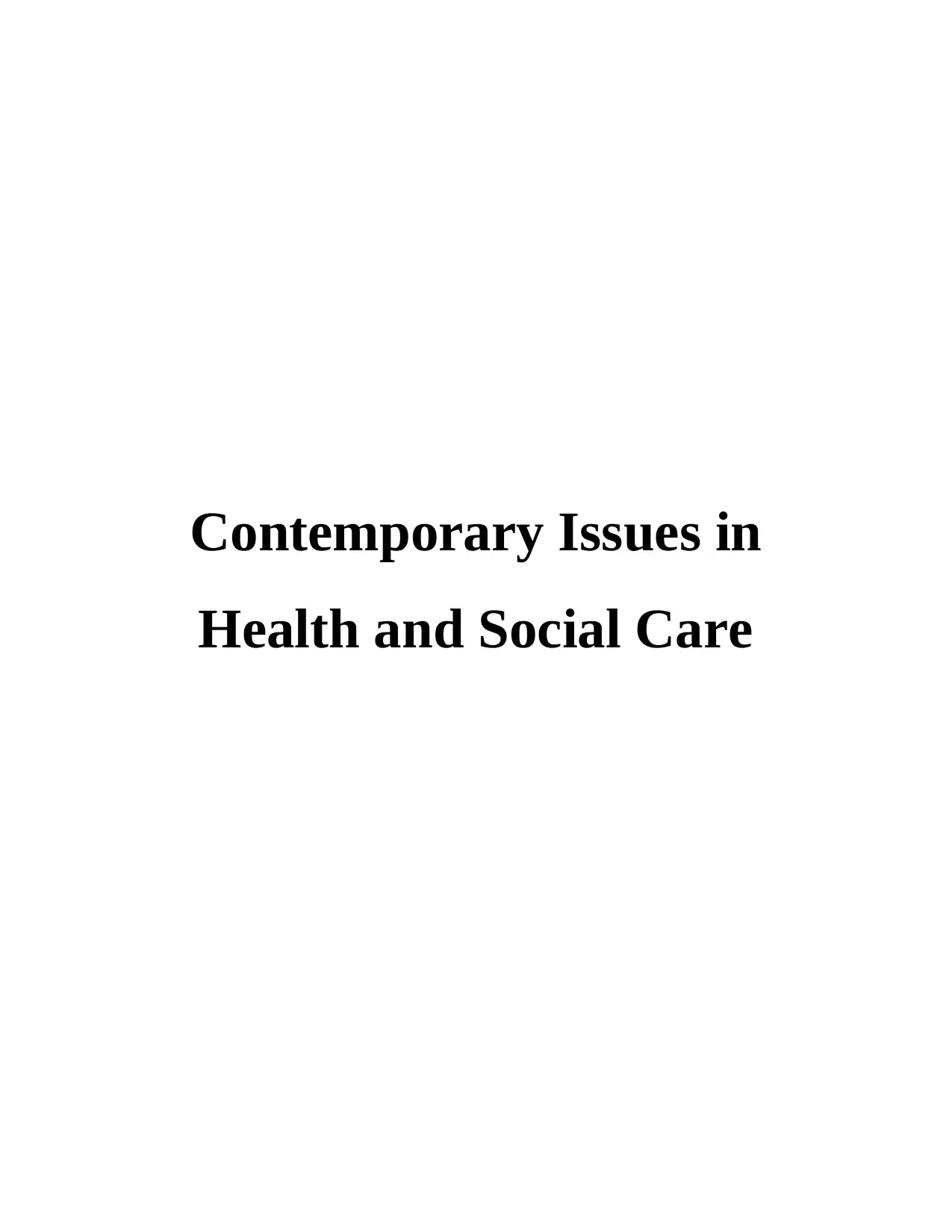
Contemporary Issues in
Health and Social Care
Health and Social Care
Paraphrase This Document
Need a fresh take? Get an instant paraphrase of this document with our AI Paraphraser
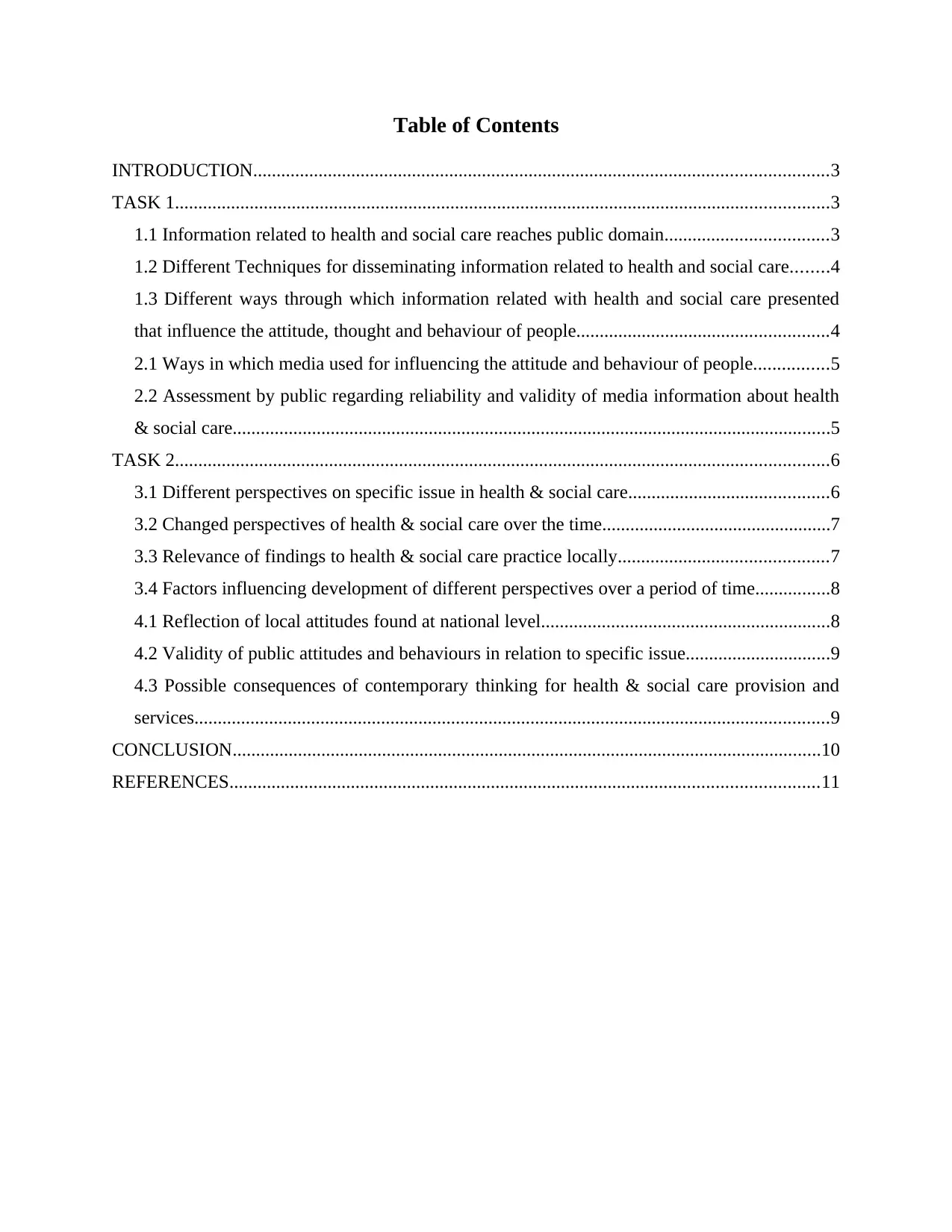
Table of Contents
INTRODUCTION...........................................................................................................................3
TASK 1............................................................................................................................................3
1.1 Information related to health and social care reaches public domain...................................3
1.2 Different Techniques for disseminating information related to health and social care........4
1.3 Different ways through which information related with health and social care presented
that influence the attitude, thought and behaviour of people......................................................4
2.1 Ways in which media used for influencing the attitude and behaviour of people................5
2.2 Assessment by public regarding reliability and validity of media information about health
& social care................................................................................................................................5
TASK 2............................................................................................................................................6
3.1 Different perspectives on specific issue in health & social care...........................................6
3.2 Changed perspectives of health & social care over the time.................................................7
3.3 Relevance of findings to health & social care practice locally.............................................7
3.4 Factors influencing development of different perspectives over a period of time................8
4.1 Reflection of local attitudes found at national level..............................................................8
4.2 Validity of public attitudes and behaviours in relation to specific issue...............................9
4.3 Possible consequences of contemporary thinking for health & social care provision and
services........................................................................................................................................9
CONCLUSION..............................................................................................................................10
REFERENCES..............................................................................................................................11
INTRODUCTION...........................................................................................................................3
TASK 1............................................................................................................................................3
1.1 Information related to health and social care reaches public domain...................................3
1.2 Different Techniques for disseminating information related to health and social care........4
1.3 Different ways through which information related with health and social care presented
that influence the attitude, thought and behaviour of people......................................................4
2.1 Ways in which media used for influencing the attitude and behaviour of people................5
2.2 Assessment by public regarding reliability and validity of media information about health
& social care................................................................................................................................5
TASK 2............................................................................................................................................6
3.1 Different perspectives on specific issue in health & social care...........................................6
3.2 Changed perspectives of health & social care over the time.................................................7
3.3 Relevance of findings to health & social care practice locally.............................................7
3.4 Factors influencing development of different perspectives over a period of time................8
4.1 Reflection of local attitudes found at national level..............................................................8
4.2 Validity of public attitudes and behaviours in relation to specific issue...............................9
4.3 Possible consequences of contemporary thinking for health & social care provision and
services........................................................................................................................................9
CONCLUSION..............................................................................................................................10
REFERENCES..............................................................................................................................11
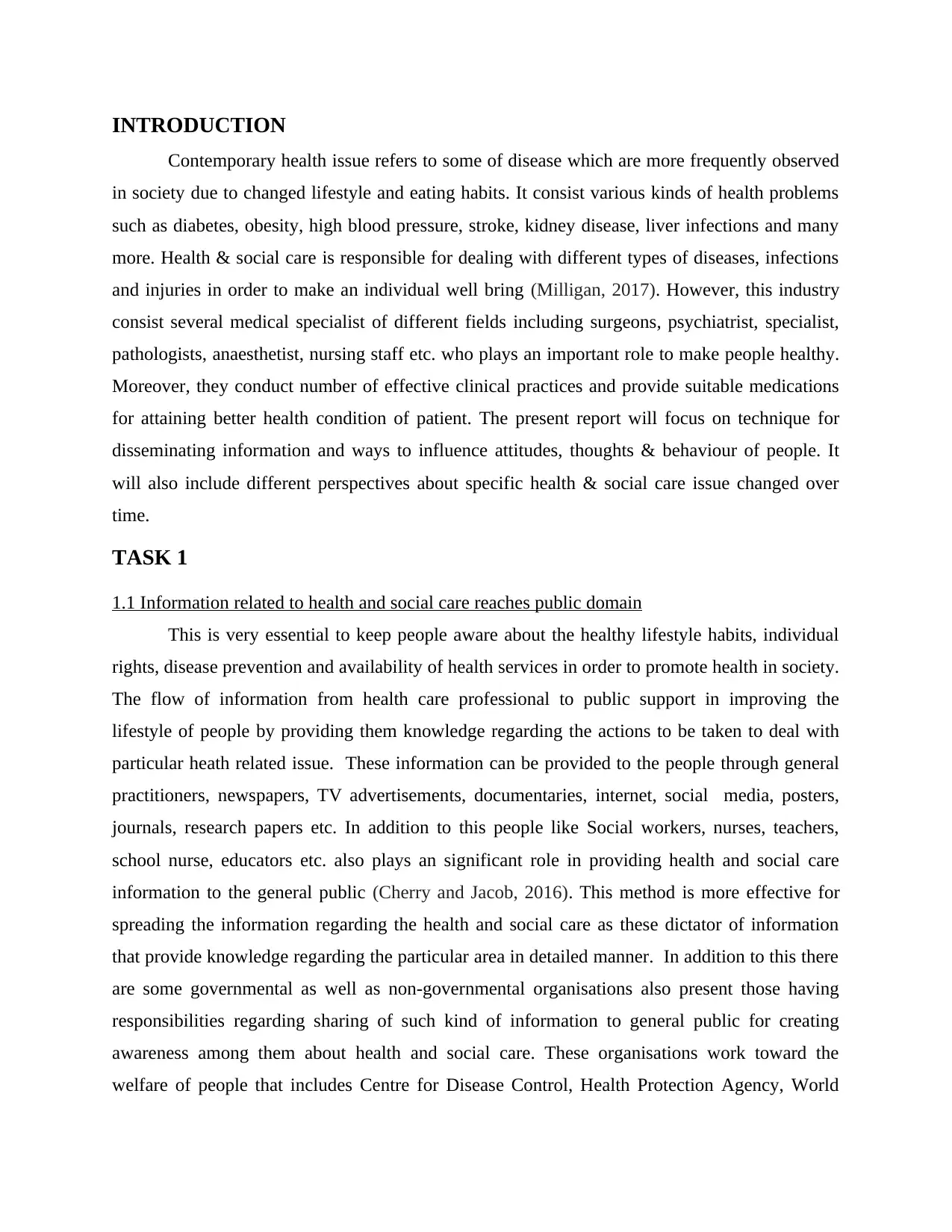
INTRODUCTION
Contemporary health issue refers to some of disease which are more frequently observed
in society due to changed lifestyle and eating habits. It consist various kinds of health problems
such as diabetes, obesity, high blood pressure, stroke, kidney disease, liver infections and many
more. Health & social care is responsible for dealing with different types of diseases, infections
and injuries in order to make an individual well bring (Milligan, 2017). However, this industry
consist several medical specialist of different fields including surgeons, psychiatrist, specialist,
pathologists, anaesthetist, nursing staff etc. who plays an important role to make people healthy.
Moreover, they conduct number of effective clinical practices and provide suitable medications
for attaining better health condition of patient. The present report will focus on technique for
disseminating information and ways to influence attitudes, thoughts & behaviour of people. It
will also include different perspectives about specific health & social care issue changed over
time.
TASK 1
1.1 Information related to health and social care reaches public domain
This is very essential to keep people aware about the healthy lifestyle habits, individual
rights, disease prevention and availability of health services in order to promote health in society.
The flow of information from health care professional to public support in improving the
lifestyle of people by providing them knowledge regarding the actions to be taken to deal with
particular heath related issue. These information can be provided to the people through general
practitioners, newspapers, TV advertisements, documentaries, internet, social media, posters,
journals, research papers etc. In addition to this people like Social workers, nurses, teachers,
school nurse, educators etc. also plays an significant role in providing health and social care
information to the general public (Cherry and Jacob, 2016). This method is more effective for
spreading the information regarding the health and social care as these dictator of information
that provide knowledge regarding the particular area in detailed manner. In addition to this there
are some governmental as well as non-governmental organisations also present those having
responsibilities regarding sharing of such kind of information to general public for creating
awareness among them about health and social care. These organisations work toward the
welfare of people that includes Centre for Disease Control, Health Protection Agency, World
Contemporary health issue refers to some of disease which are more frequently observed
in society due to changed lifestyle and eating habits. It consist various kinds of health problems
such as diabetes, obesity, high blood pressure, stroke, kidney disease, liver infections and many
more. Health & social care is responsible for dealing with different types of diseases, infections
and injuries in order to make an individual well bring (Milligan, 2017). However, this industry
consist several medical specialist of different fields including surgeons, psychiatrist, specialist,
pathologists, anaesthetist, nursing staff etc. who plays an important role to make people healthy.
Moreover, they conduct number of effective clinical practices and provide suitable medications
for attaining better health condition of patient. The present report will focus on technique for
disseminating information and ways to influence attitudes, thoughts & behaviour of people. It
will also include different perspectives about specific health & social care issue changed over
time.
TASK 1
1.1 Information related to health and social care reaches public domain
This is very essential to keep people aware about the healthy lifestyle habits, individual
rights, disease prevention and availability of health services in order to promote health in society.
The flow of information from health care professional to public support in improving the
lifestyle of people by providing them knowledge regarding the actions to be taken to deal with
particular heath related issue. These information can be provided to the people through general
practitioners, newspapers, TV advertisements, documentaries, internet, social media, posters,
journals, research papers etc. In addition to this people like Social workers, nurses, teachers,
school nurse, educators etc. also plays an significant role in providing health and social care
information to the general public (Cherry and Jacob, 2016). This method is more effective for
spreading the information regarding the health and social care as these dictator of information
that provide knowledge regarding the particular area in detailed manner. In addition to this there
are some governmental as well as non-governmental organisations also present those having
responsibilities regarding sharing of such kind of information to general public for creating
awareness among them about health and social care. These organisations work toward the
welfare of people that includes Centre for Disease Control, Health Protection Agency, World
⊘ This is a preview!⊘
Do you want full access?
Subscribe today to unlock all pages.

Trusted by 1+ million students worldwide
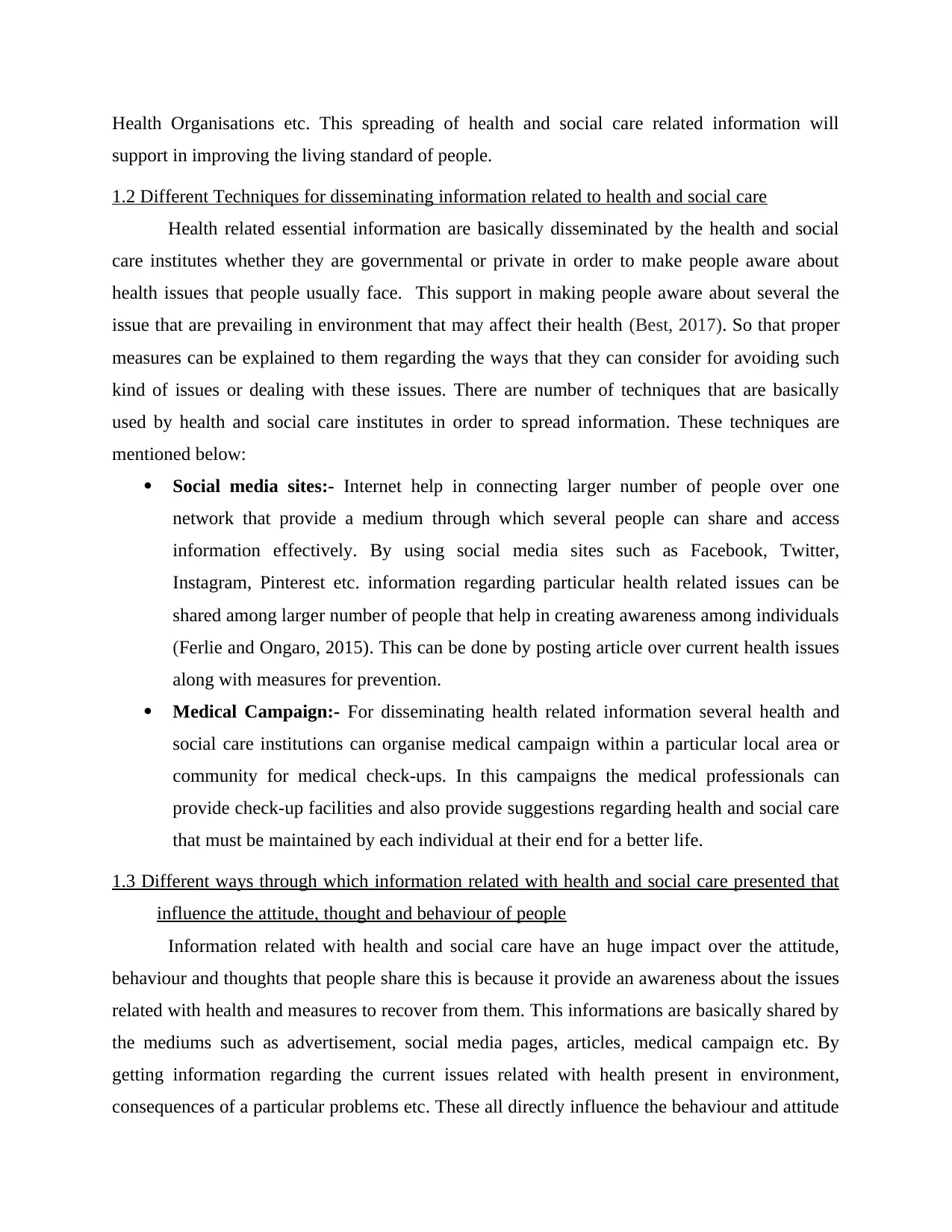
Health Organisations etc. This spreading of health and social care related information will
support in improving the living standard of people.
1.2 Different Techniques for disseminating information related to health and social care
Health related essential information are basically disseminated by the health and social
care institutes whether they are governmental or private in order to make people aware about
health issues that people usually face. This support in making people aware about several the
issue that are prevailing in environment that may affect their health (Best, 2017). So that proper
measures can be explained to them regarding the ways that they can consider for avoiding such
kind of issues or dealing with these issues. There are number of techniques that are basically
used by health and social care institutes in order to spread information. These techniques are
mentioned below:
Social media sites:- Internet help in connecting larger number of people over one
network that provide a medium through which several people can share and access
information effectively. By using social media sites such as Facebook, Twitter,
Instagram, Pinterest etc. information regarding particular health related issues can be
shared among larger number of people that help in creating awareness among individuals
(Ferlie and Ongaro, 2015). This can be done by posting article over current health issues
along with measures for prevention.
Medical Campaign:- For disseminating health related information several health and
social care institutions can organise medical campaign within a particular local area or
community for medical check-ups. In this campaigns the medical professionals can
provide check-up facilities and also provide suggestions regarding health and social care
that must be maintained by each individual at their end for a better life.
1.3 Different ways through which information related with health and social care presented that
influence the attitude, thought and behaviour of people
Information related with health and social care have an huge impact over the attitude,
behaviour and thoughts that people share this is because it provide an awareness about the issues
related with health and measures to recover from them. This informations are basically shared by
the mediums such as advertisement, social media pages, articles, medical campaign etc. By
getting information regarding the current issues related with health present in environment,
consequences of a particular problems etc. These all directly influence the behaviour and attitude
support in improving the living standard of people.
1.2 Different Techniques for disseminating information related to health and social care
Health related essential information are basically disseminated by the health and social
care institutes whether they are governmental or private in order to make people aware about
health issues that people usually face. This support in making people aware about several the
issue that are prevailing in environment that may affect their health (Best, 2017). So that proper
measures can be explained to them regarding the ways that they can consider for avoiding such
kind of issues or dealing with these issues. There are number of techniques that are basically
used by health and social care institutes in order to spread information. These techniques are
mentioned below:
Social media sites:- Internet help in connecting larger number of people over one
network that provide a medium through which several people can share and access
information effectively. By using social media sites such as Facebook, Twitter,
Instagram, Pinterest etc. information regarding particular health related issues can be
shared among larger number of people that help in creating awareness among individuals
(Ferlie and Ongaro, 2015). This can be done by posting article over current health issues
along with measures for prevention.
Medical Campaign:- For disseminating health related information several health and
social care institutions can organise medical campaign within a particular local area or
community for medical check-ups. In this campaigns the medical professionals can
provide check-up facilities and also provide suggestions regarding health and social care
that must be maintained by each individual at their end for a better life.
1.3 Different ways through which information related with health and social care presented that
influence the attitude, thought and behaviour of people
Information related with health and social care have an huge impact over the attitude,
behaviour and thoughts that people share this is because it provide an awareness about the issues
related with health and measures to recover from them. This informations are basically shared by
the mediums such as advertisement, social media pages, articles, medical campaign etc. By
getting information regarding the current issues related with health present in environment,
consequences of a particular problems etc. These all directly influence the behaviour and attitude
Paraphrase This Document
Need a fresh take? Get an instant paraphrase of this document with our AI Paraphraser
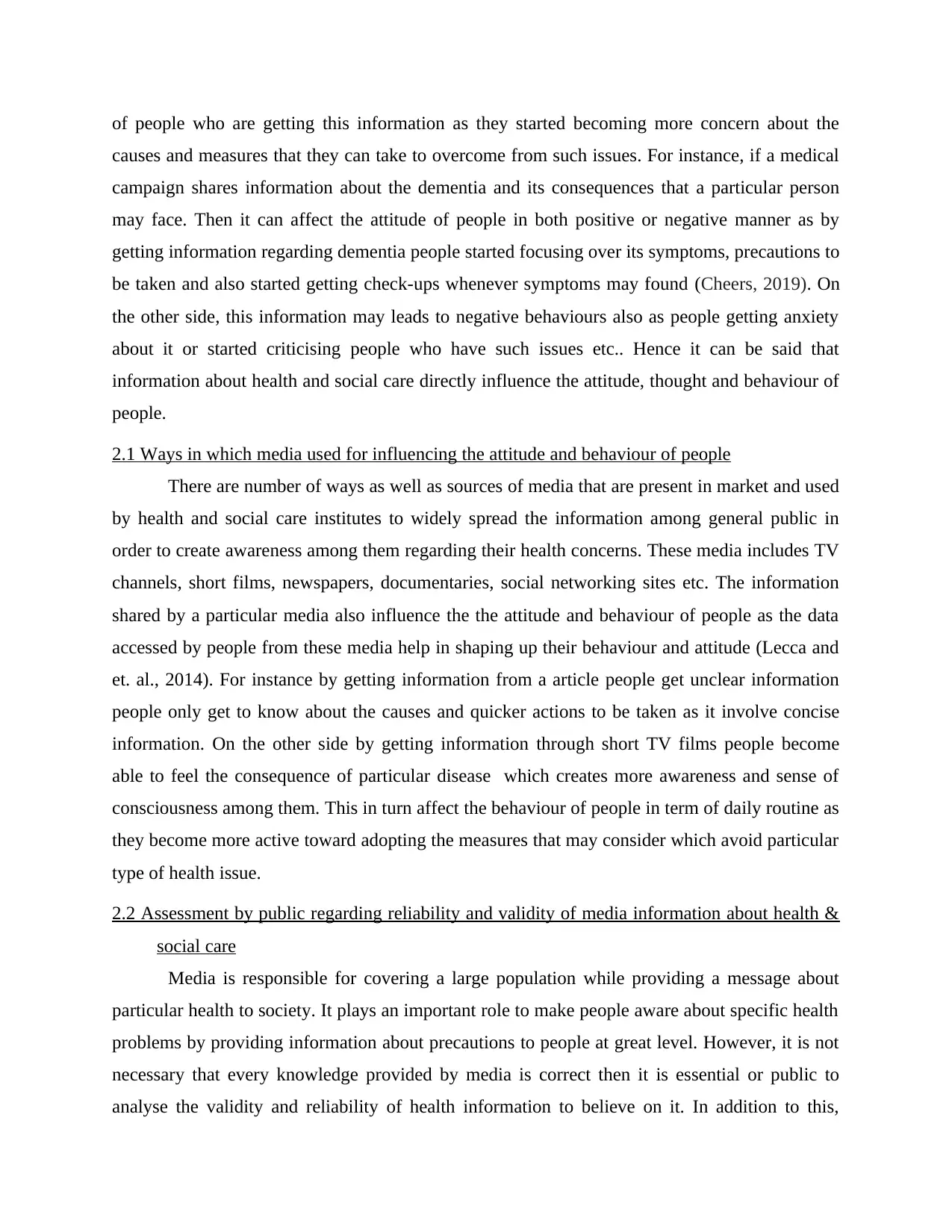
of people who are getting this information as they started becoming more concern about the
causes and measures that they can take to overcome from such issues. For instance, if a medical
campaign shares information about the dementia and its consequences that a particular person
may face. Then it can affect the attitude of people in both positive or negative manner as by
getting information regarding dementia people started focusing over its symptoms, precautions to
be taken and also started getting check-ups whenever symptoms may found (Cheers, 2019). On
the other side, this information may leads to negative behaviours also as people getting anxiety
about it or started criticising people who have such issues etc.. Hence it can be said that
information about health and social care directly influence the attitude, thought and behaviour of
people.
2.1 Ways in which media used for influencing the attitude and behaviour of people
There are number of ways as well as sources of media that are present in market and used
by health and social care institutes to widely spread the information among general public in
order to create awareness among them regarding their health concerns. These media includes TV
channels, short films, newspapers, documentaries, social networking sites etc. The information
shared by a particular media also influence the the attitude and behaviour of people as the data
accessed by people from these media help in shaping up their behaviour and attitude (Lecca and
et. al., 2014). For instance by getting information from a article people get unclear information
people only get to know about the causes and quicker actions to be taken as it involve concise
information. On the other side by getting information through short TV films people become
able to feel the consequence of particular disease which creates more awareness and sense of
consciousness among them. This in turn affect the behaviour of people in term of daily routine as
they become more active toward adopting the measures that may consider which avoid particular
type of health issue.
2.2 Assessment by public regarding reliability and validity of media information about health &
social care
Media is responsible for covering a large population while providing a message about
particular health to society. It plays an important role to make people aware about specific health
problems by providing information about precautions to people at great level. However, it is not
necessary that every knowledge provided by media is correct then it is essential or public to
analyse the validity and reliability of health information to believe on it. In addition to this,
causes and measures that they can take to overcome from such issues. For instance, if a medical
campaign shares information about the dementia and its consequences that a particular person
may face. Then it can affect the attitude of people in both positive or negative manner as by
getting information regarding dementia people started focusing over its symptoms, precautions to
be taken and also started getting check-ups whenever symptoms may found (Cheers, 2019). On
the other side, this information may leads to negative behaviours also as people getting anxiety
about it or started criticising people who have such issues etc.. Hence it can be said that
information about health and social care directly influence the attitude, thought and behaviour of
people.
2.1 Ways in which media used for influencing the attitude and behaviour of people
There are number of ways as well as sources of media that are present in market and used
by health and social care institutes to widely spread the information among general public in
order to create awareness among them regarding their health concerns. These media includes TV
channels, short films, newspapers, documentaries, social networking sites etc. The information
shared by a particular media also influence the the attitude and behaviour of people as the data
accessed by people from these media help in shaping up their behaviour and attitude (Lecca and
et. al., 2014). For instance by getting information from a article people get unclear information
people only get to know about the causes and quicker actions to be taken as it involve concise
information. On the other side by getting information through short TV films people become
able to feel the consequence of particular disease which creates more awareness and sense of
consciousness among them. This in turn affect the behaviour of people in term of daily routine as
they become more active toward adopting the measures that may consider which avoid particular
type of health issue.
2.2 Assessment by public regarding reliability and validity of media information about health &
social care
Media is responsible for covering a large population while providing a message about
particular health to society. It plays an important role to make people aware about specific health
problems by providing information about precautions to people at great level. However, it is not
necessary that every knowledge provided by media is correct then it is essential or public to
analyse the validity and reliability of health information to believe on it. In addition to this,
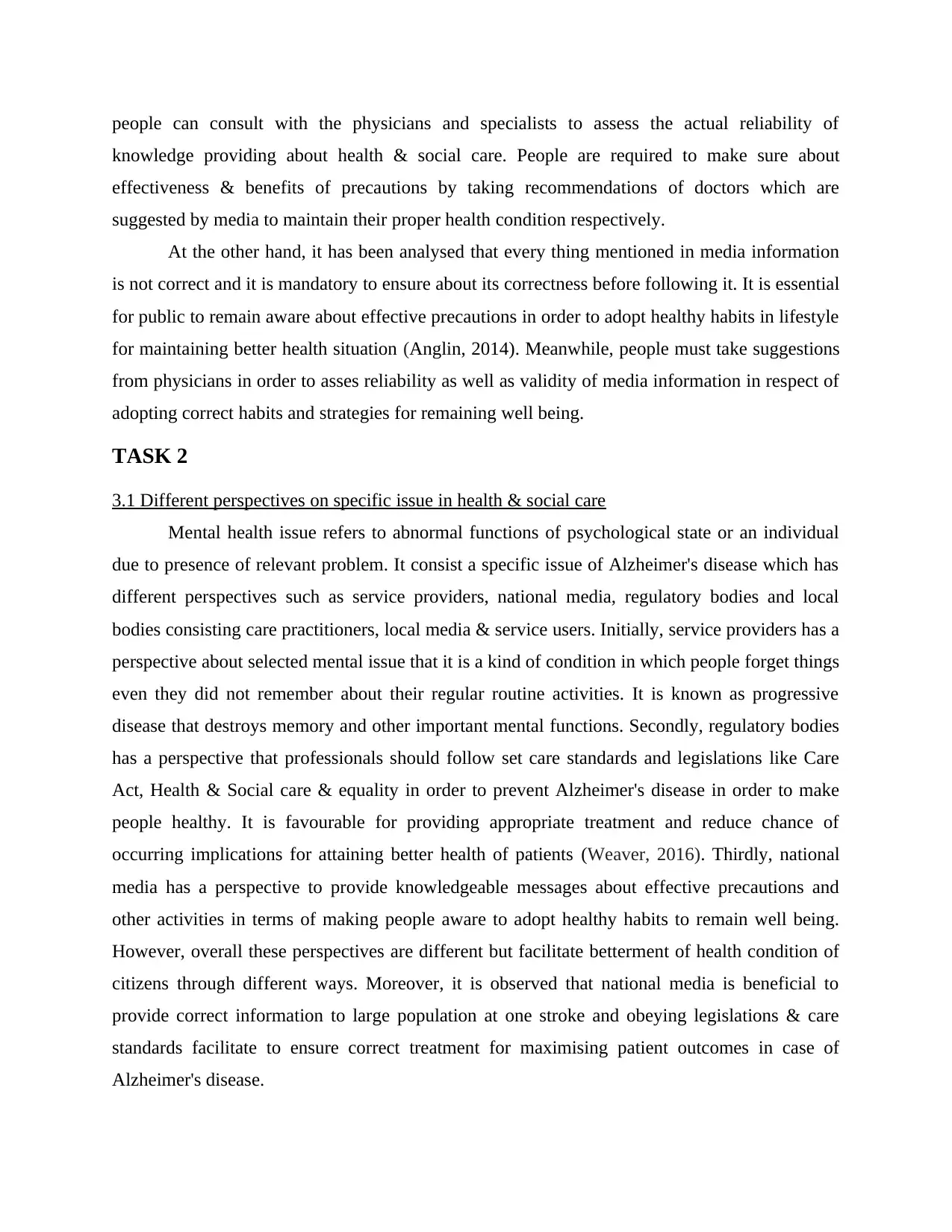
people can consult with the physicians and specialists to assess the actual reliability of
knowledge providing about health & social care. People are required to make sure about
effectiveness & benefits of precautions by taking recommendations of doctors which are
suggested by media to maintain their proper health condition respectively.
At the other hand, it has been analysed that every thing mentioned in media information
is not correct and it is mandatory to ensure about its correctness before following it. It is essential
for public to remain aware about effective precautions in order to adopt healthy habits in lifestyle
for maintaining better health situation (Anglin, 2014). Meanwhile, people must take suggestions
from physicians in order to asses reliability as well as validity of media information in respect of
adopting correct habits and strategies for remaining well being.
TASK 2
3.1 Different perspectives on specific issue in health & social care
Mental health issue refers to abnormal functions of psychological state or an individual
due to presence of relevant problem. It consist a specific issue of Alzheimer's disease which has
different perspectives such as service providers, national media, regulatory bodies and local
bodies consisting care practitioners, local media & service users. Initially, service providers has a
perspective about selected mental issue that it is a kind of condition in which people forget things
even they did not remember about their regular routine activities. It is known as progressive
disease that destroys memory and other important mental functions. Secondly, regulatory bodies
has a perspective that professionals should follow set care standards and legislations like Care
Act, Health & Social care & equality in order to prevent Alzheimer's disease in order to make
people healthy. It is favourable for providing appropriate treatment and reduce chance of
occurring implications for attaining better health of patients (Weaver, 2016). Thirdly, national
media has a perspective to provide knowledgeable messages about effective precautions and
other activities in terms of making people aware to adopt healthy habits to remain well being.
However, overall these perspectives are different but facilitate betterment of health condition of
citizens through different ways. Moreover, it is observed that national media is beneficial to
provide correct information to large population at one stroke and obeying legislations & care
standards facilitate to ensure correct treatment for maximising patient outcomes in case of
Alzheimer's disease.
knowledge providing about health & social care. People are required to make sure about
effectiveness & benefits of precautions by taking recommendations of doctors which are
suggested by media to maintain their proper health condition respectively.
At the other hand, it has been analysed that every thing mentioned in media information
is not correct and it is mandatory to ensure about its correctness before following it. It is essential
for public to remain aware about effective precautions in order to adopt healthy habits in lifestyle
for maintaining better health situation (Anglin, 2014). Meanwhile, people must take suggestions
from physicians in order to asses reliability as well as validity of media information in respect of
adopting correct habits and strategies for remaining well being.
TASK 2
3.1 Different perspectives on specific issue in health & social care
Mental health issue refers to abnormal functions of psychological state or an individual
due to presence of relevant problem. It consist a specific issue of Alzheimer's disease which has
different perspectives such as service providers, national media, regulatory bodies and local
bodies consisting care practitioners, local media & service users. Initially, service providers has a
perspective about selected mental issue that it is a kind of condition in which people forget things
even they did not remember about their regular routine activities. It is known as progressive
disease that destroys memory and other important mental functions. Secondly, regulatory bodies
has a perspective that professionals should follow set care standards and legislations like Care
Act, Health & Social care & equality in order to prevent Alzheimer's disease in order to make
people healthy. It is favourable for providing appropriate treatment and reduce chance of
occurring implications for attaining better health of patients (Weaver, 2016). Thirdly, national
media has a perspective to provide knowledgeable messages about effective precautions and
other activities in terms of making people aware to adopt healthy habits to remain well being.
However, overall these perspectives are different but facilitate betterment of health condition of
citizens through different ways. Moreover, it is observed that national media is beneficial to
provide correct information to large population at one stroke and obeying legislations & care
standards facilitate to ensure correct treatment for maximising patient outcomes in case of
Alzheimer's disease.
⊘ This is a preview!⊘
Do you want full access?
Subscribe today to unlock all pages.

Trusted by 1+ million students worldwide
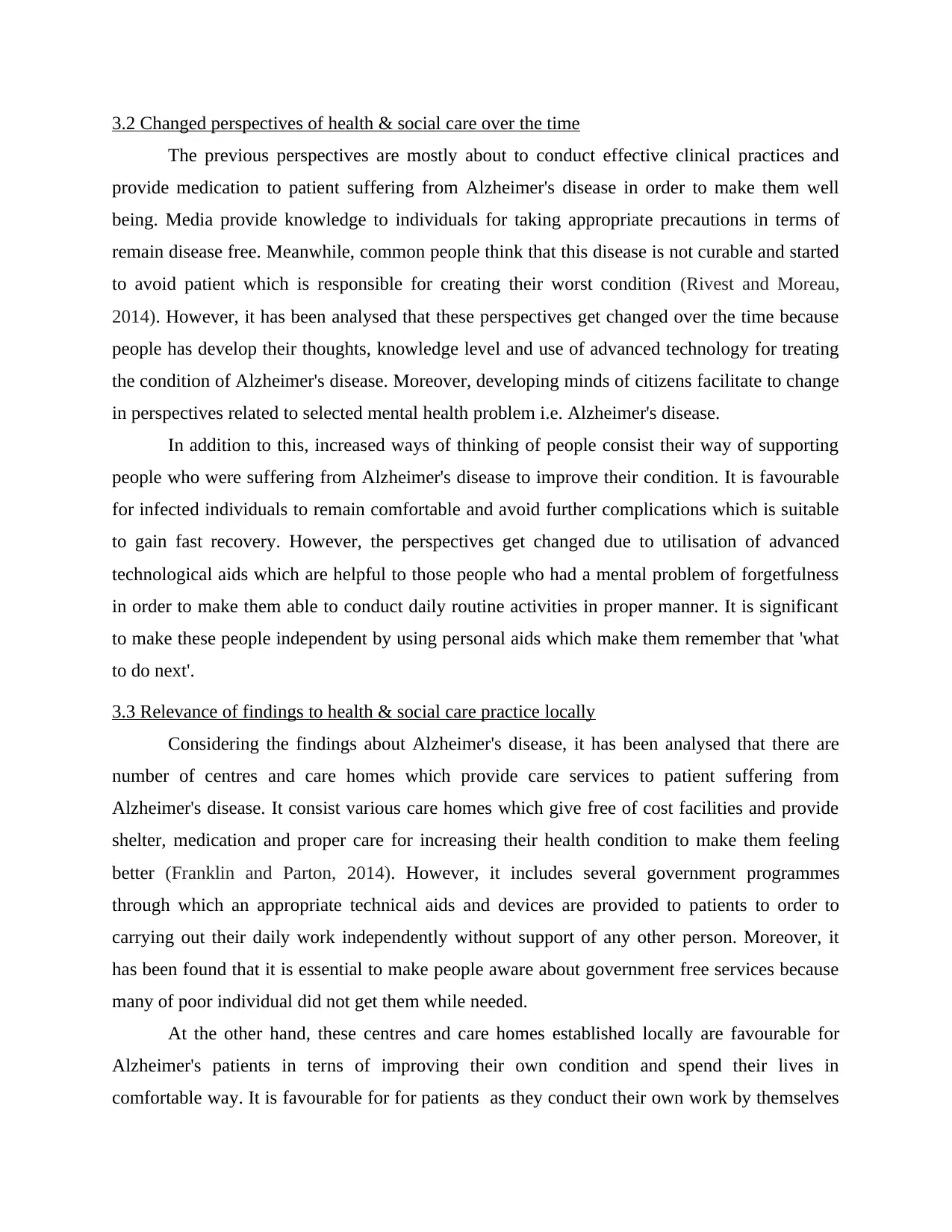
3.2 Changed perspectives of health & social care over the time
The previous perspectives are mostly about to conduct effective clinical practices and
provide medication to patient suffering from Alzheimer's disease in order to make them well
being. Media provide knowledge to individuals for taking appropriate precautions in terms of
remain disease free. Meanwhile, common people think that this disease is not curable and started
to avoid patient which is responsible for creating their worst condition (Rivest and Moreau,
2014). However, it has been analysed that these perspectives get changed over the time because
people has develop their thoughts, knowledge level and use of advanced technology for treating
the condition of Alzheimer's disease. Moreover, developing minds of citizens facilitate to change
in perspectives related to selected mental health problem i.e. Alzheimer's disease.
In addition to this, increased ways of thinking of people consist their way of supporting
people who were suffering from Alzheimer's disease to improve their condition. It is favourable
for infected individuals to remain comfortable and avoid further complications which is suitable
to gain fast recovery. However, the perspectives get changed due to utilisation of advanced
technological aids which are helpful to those people who had a mental problem of forgetfulness
in order to make them able to conduct daily routine activities in proper manner. It is significant
to make these people independent by using personal aids which make them remember that 'what
to do next'.
3.3 Relevance of findings to health & social care practice locally
Considering the findings about Alzheimer's disease, it has been analysed that there are
number of centres and care homes which provide care services to patient suffering from
Alzheimer's disease. It consist various care homes which give free of cost facilities and provide
shelter, medication and proper care for increasing their health condition to make them feeling
better (Franklin and Parton, 2014). However, it includes several government programmes
through which an appropriate technical aids and devices are provided to patients to order to
carrying out their daily work independently without support of any other person. Moreover, it
has been found that it is essential to make people aware about government free services because
many of poor individual did not get them while needed.
At the other hand, these centres and care homes established locally are favourable for
Alzheimer's patients in terns of improving their own condition and spend their lives in
comfortable way. It is favourable for for patients as they conduct their own work by themselves
The previous perspectives are mostly about to conduct effective clinical practices and
provide medication to patient suffering from Alzheimer's disease in order to make them well
being. Media provide knowledge to individuals for taking appropriate precautions in terms of
remain disease free. Meanwhile, common people think that this disease is not curable and started
to avoid patient which is responsible for creating their worst condition (Rivest and Moreau,
2014). However, it has been analysed that these perspectives get changed over the time because
people has develop their thoughts, knowledge level and use of advanced technology for treating
the condition of Alzheimer's disease. Moreover, developing minds of citizens facilitate to change
in perspectives related to selected mental health problem i.e. Alzheimer's disease.
In addition to this, increased ways of thinking of people consist their way of supporting
people who were suffering from Alzheimer's disease to improve their condition. It is favourable
for infected individuals to remain comfortable and avoid further complications which is suitable
to gain fast recovery. However, the perspectives get changed due to utilisation of advanced
technological aids which are helpful to those people who had a mental problem of forgetfulness
in order to make them able to conduct daily routine activities in proper manner. It is significant
to make these people independent by using personal aids which make them remember that 'what
to do next'.
3.3 Relevance of findings to health & social care practice locally
Considering the findings about Alzheimer's disease, it has been analysed that there are
number of centres and care homes which provide care services to patient suffering from
Alzheimer's disease. It consist various care homes which give free of cost facilities and provide
shelter, medication and proper care for increasing their health condition to make them feeling
better (Franklin and Parton, 2014). However, it includes several government programmes
through which an appropriate technical aids and devices are provided to patients to order to
carrying out their daily work independently without support of any other person. Moreover, it
has been found that it is essential to make people aware about government free services because
many of poor individual did not get them while needed.
At the other hand, these centres and care homes established locally are favourable for
Alzheimer's patients in terns of improving their own condition and spend their lives in
comfortable way. It is favourable for for patients as they conduct their own work by themselves
Paraphrase This Document
Need a fresh take? Get an instant paraphrase of this document with our AI Paraphraser
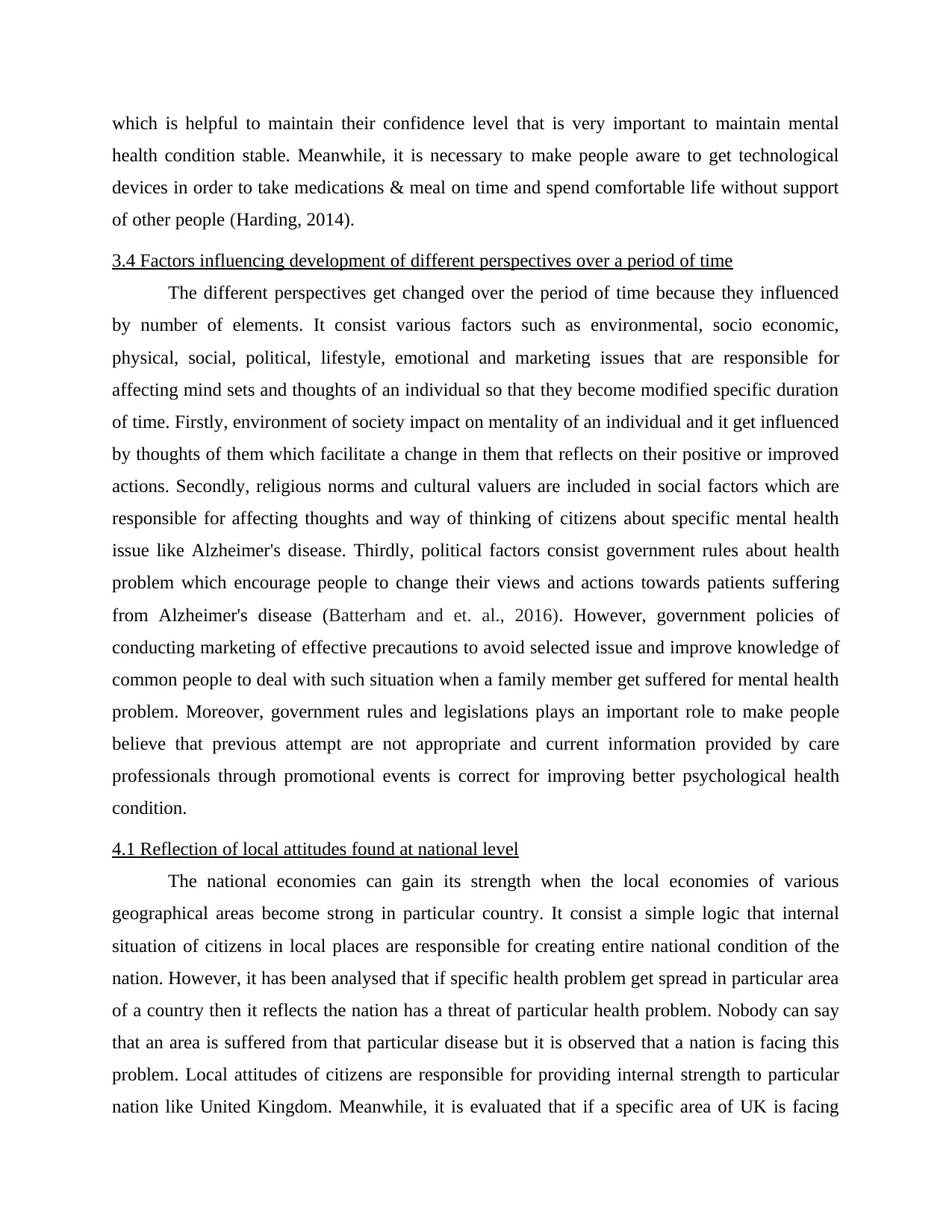
which is helpful to maintain their confidence level that is very important to maintain mental
health condition stable. Meanwhile, it is necessary to make people aware to get technological
devices in order to take medications & meal on time and spend comfortable life without support
of other people (Harding, 2014).
3.4 Factors influencing development of different perspectives over a period of time
The different perspectives get changed over the period of time because they influenced
by number of elements. It consist various factors such as environmental, socio economic,
physical, social, political, lifestyle, emotional and marketing issues that are responsible for
affecting mind sets and thoughts of an individual so that they become modified specific duration
of time. Firstly, environment of society impact on mentality of an individual and it get influenced
by thoughts of them which facilitate a change in them that reflects on their positive or improved
actions. Secondly, religious norms and cultural valuers are included in social factors which are
responsible for affecting thoughts and way of thinking of citizens about specific mental health
issue like Alzheimer's disease. Thirdly, political factors consist government rules about health
problem which encourage people to change their views and actions towards patients suffering
from Alzheimer's disease (Batterham and et. al., 2016). However, government policies of
conducting marketing of effective precautions to avoid selected issue and improve knowledge of
common people to deal with such situation when a family member get suffered for mental health
problem. Moreover, government rules and legislations plays an important role to make people
believe that previous attempt are not appropriate and current information provided by care
professionals through promotional events is correct for improving better psychological health
condition.
4.1 Reflection of local attitudes found at national level
The national economies can gain its strength when the local economies of various
geographical areas become strong in particular country. It consist a simple logic that internal
situation of citizens in local places are responsible for creating entire national condition of the
nation. However, it has been analysed that if specific health problem get spread in particular area
of a country then it reflects the nation has a threat of particular health problem. Nobody can say
that an area is suffered from that particular disease but it is observed that a nation is facing this
problem. Local attitudes of citizens are responsible for providing internal strength to particular
nation like United Kingdom. Meanwhile, it is evaluated that if a specific area of UK is facing
health condition stable. Meanwhile, it is necessary to make people aware to get technological
devices in order to take medications & meal on time and spend comfortable life without support
of other people (Harding, 2014).
3.4 Factors influencing development of different perspectives over a period of time
The different perspectives get changed over the period of time because they influenced
by number of elements. It consist various factors such as environmental, socio economic,
physical, social, political, lifestyle, emotional and marketing issues that are responsible for
affecting mind sets and thoughts of an individual so that they become modified specific duration
of time. Firstly, environment of society impact on mentality of an individual and it get influenced
by thoughts of them which facilitate a change in them that reflects on their positive or improved
actions. Secondly, religious norms and cultural valuers are included in social factors which are
responsible for affecting thoughts and way of thinking of citizens about specific mental health
issue like Alzheimer's disease. Thirdly, political factors consist government rules about health
problem which encourage people to change their views and actions towards patients suffering
from Alzheimer's disease (Batterham and et. al., 2016). However, government policies of
conducting marketing of effective precautions to avoid selected issue and improve knowledge of
common people to deal with such situation when a family member get suffered for mental health
problem. Moreover, government rules and legislations plays an important role to make people
believe that previous attempt are not appropriate and current information provided by care
professionals through promotional events is correct for improving better psychological health
condition.
4.1 Reflection of local attitudes found at national level
The national economies can gain its strength when the local economies of various
geographical areas become strong in particular country. It consist a simple logic that internal
situation of citizens in local places are responsible for creating entire national condition of the
nation. However, it has been analysed that if specific health problem get spread in particular area
of a country then it reflects the nation has a threat of particular health problem. Nobody can say
that an area is suffered from that particular disease but it is observed that a nation is facing this
problem. Local attitudes of citizens are responsible for providing internal strength to particular
nation like United Kingdom. Meanwhile, it is evaluated that if a specific area of UK is facing
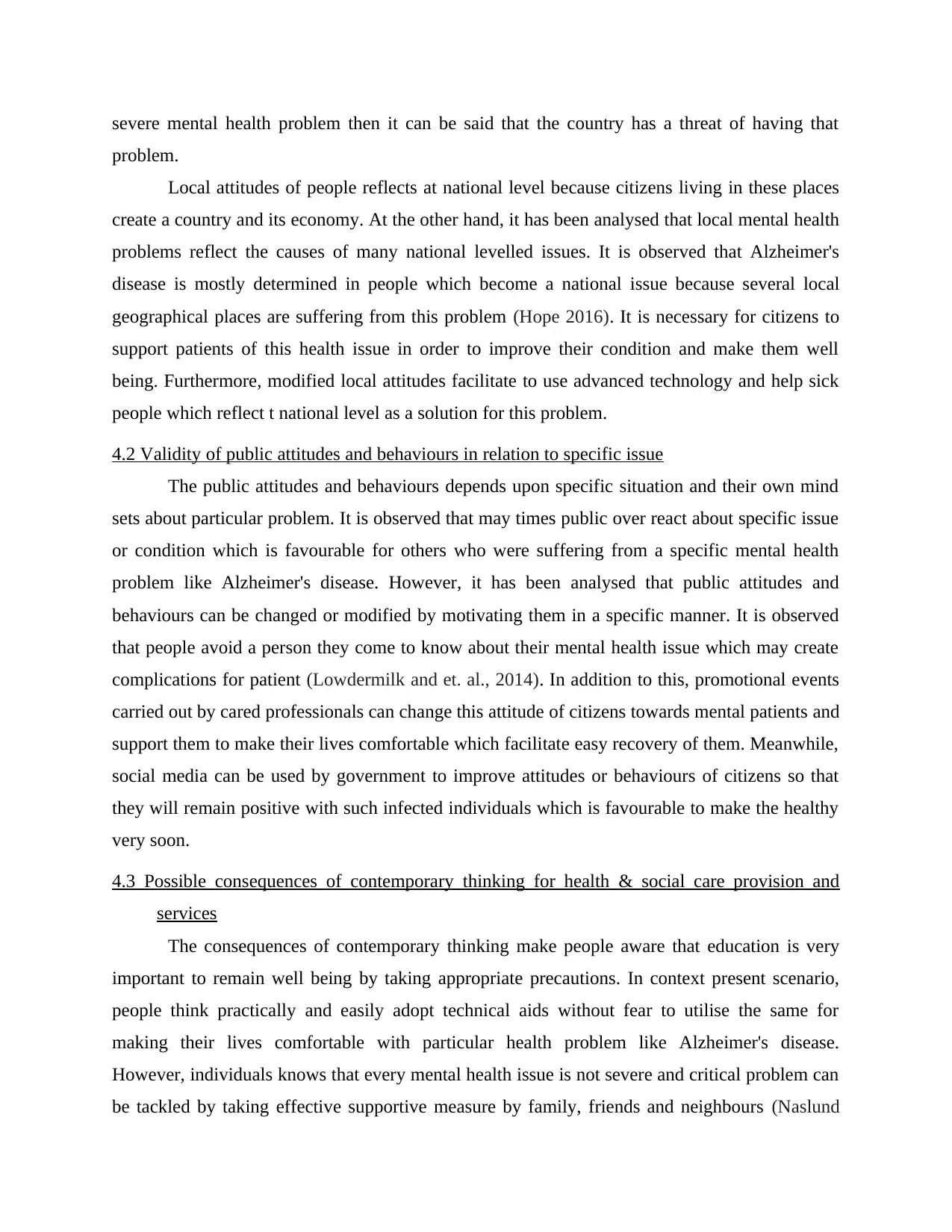
severe mental health problem then it can be said that the country has a threat of having that
problem.
Local attitudes of people reflects at national level because citizens living in these places
create a country and its economy. At the other hand, it has been analysed that local mental health
problems reflect the causes of many national levelled issues. It is observed that Alzheimer's
disease is mostly determined in people which become a national issue because several local
geographical places are suffering from this problem (Hope 2016). It is necessary for citizens to
support patients of this health issue in order to improve their condition and make them well
being. Furthermore, modified local attitudes facilitate to use advanced technology and help sick
people which reflect t national level as a solution for this problem.
4.2 Validity of public attitudes and behaviours in relation to specific issue
The public attitudes and behaviours depends upon specific situation and their own mind
sets about particular problem. It is observed that may times public over react about specific issue
or condition which is favourable for others who were suffering from a specific mental health
problem like Alzheimer's disease. However, it has been analysed that public attitudes and
behaviours can be changed or modified by motivating them in a specific manner. It is observed
that people avoid a person they come to know about their mental health issue which may create
complications for patient (Lowdermilk and et. al., 2014). In addition to this, promotional events
carried out by cared professionals can change this attitude of citizens towards mental patients and
support them to make their lives comfortable which facilitate easy recovery of them. Meanwhile,
social media can be used by government to improve attitudes or behaviours of citizens so that
they will remain positive with such infected individuals which is favourable to make the healthy
very soon.
4.3 Possible consequences of contemporary thinking for health & social care provision and
services
The consequences of contemporary thinking make people aware that education is very
important to remain well being by taking appropriate precautions. In context present scenario,
people think practically and easily adopt technical aids without fear to utilise the same for
making their lives comfortable with particular health problem like Alzheimer's disease.
However, individuals knows that every mental health issue is not severe and critical problem can
be tackled by taking effective supportive measure by family, friends and neighbours (Naslund
problem.
Local attitudes of people reflects at national level because citizens living in these places
create a country and its economy. At the other hand, it has been analysed that local mental health
problems reflect the causes of many national levelled issues. It is observed that Alzheimer's
disease is mostly determined in people which become a national issue because several local
geographical places are suffering from this problem (Hope 2016). It is necessary for citizens to
support patients of this health issue in order to improve their condition and make them well
being. Furthermore, modified local attitudes facilitate to use advanced technology and help sick
people which reflect t national level as a solution for this problem.
4.2 Validity of public attitudes and behaviours in relation to specific issue
The public attitudes and behaviours depends upon specific situation and their own mind
sets about particular problem. It is observed that may times public over react about specific issue
or condition which is favourable for others who were suffering from a specific mental health
problem like Alzheimer's disease. However, it has been analysed that public attitudes and
behaviours can be changed or modified by motivating them in a specific manner. It is observed
that people avoid a person they come to know about their mental health issue which may create
complications for patient (Lowdermilk and et. al., 2014). In addition to this, promotional events
carried out by cared professionals can change this attitude of citizens towards mental patients and
support them to make their lives comfortable which facilitate easy recovery of them. Meanwhile,
social media can be used by government to improve attitudes or behaviours of citizens so that
they will remain positive with such infected individuals which is favourable to make the healthy
very soon.
4.3 Possible consequences of contemporary thinking for health & social care provision and
services
The consequences of contemporary thinking make people aware that education is very
important to remain well being by taking appropriate precautions. In context present scenario,
people think practically and easily adopt technical aids without fear to utilise the same for
making their lives comfortable with particular health problem like Alzheimer's disease.
However, individuals knows that every mental health issue is not severe and critical problem can
be tackled by taking effective supportive measure by family, friends and neighbours (Naslund
⊘ This is a preview!⊘
Do you want full access?
Subscribe today to unlock all pages.

Trusted by 1+ million students worldwide
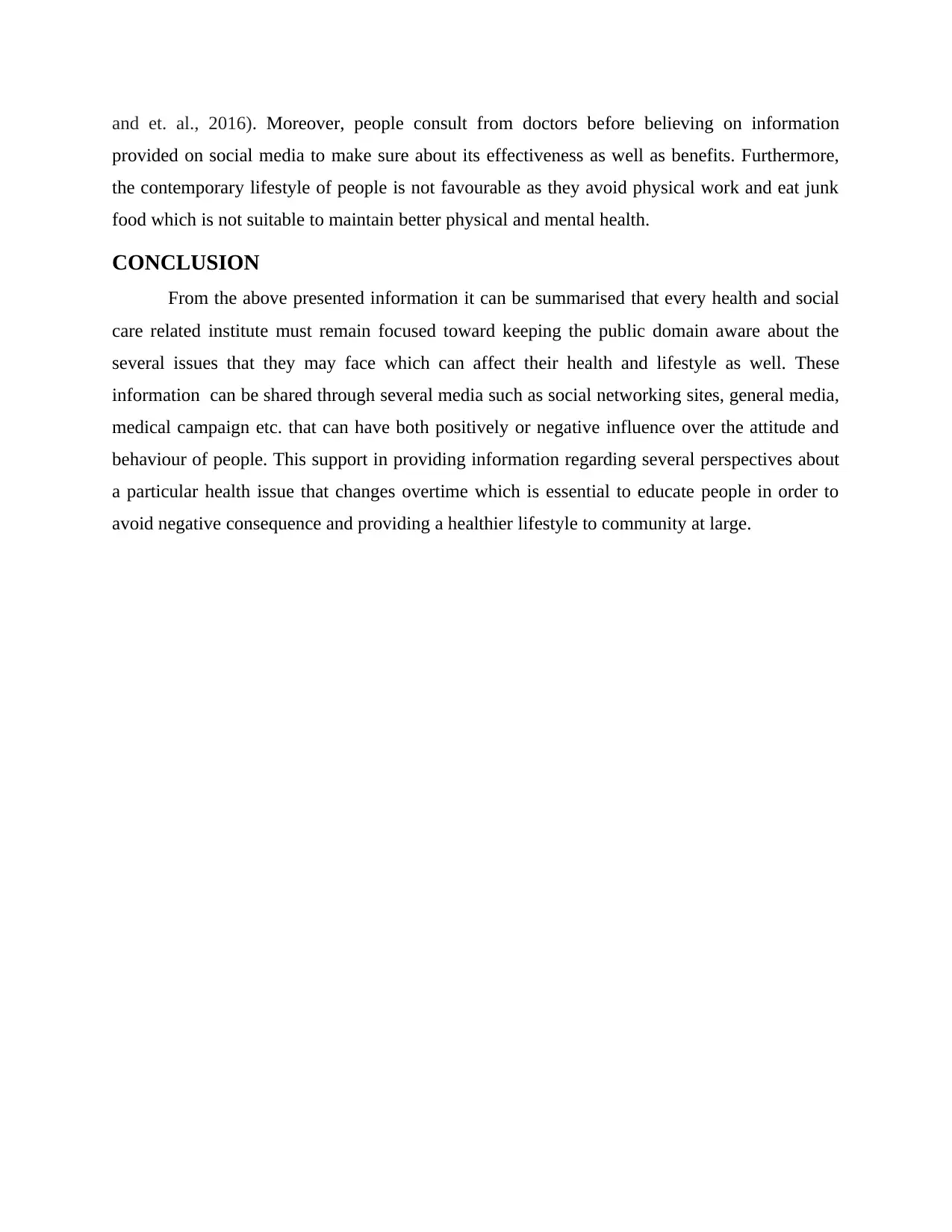
and et. al., 2016). Moreover, people consult from doctors before believing on information
provided on social media to make sure about its effectiveness as well as benefits. Furthermore,
the contemporary lifestyle of people is not favourable as they avoid physical work and eat junk
food which is not suitable to maintain better physical and mental health.
CONCLUSION
From the above presented information it can be summarised that every health and social
care related institute must remain focused toward keeping the public domain aware about the
several issues that they may face which can affect their health and lifestyle as well. These
information can be shared through several media such as social networking sites, general media,
medical campaign etc. that can have both positively or negative influence over the attitude and
behaviour of people. This support in providing information regarding several perspectives about
a particular health issue that changes overtime which is essential to educate people in order to
avoid negative consequence and providing a healthier lifestyle to community at large.
provided on social media to make sure about its effectiveness as well as benefits. Furthermore,
the contemporary lifestyle of people is not favourable as they avoid physical work and eat junk
food which is not suitable to maintain better physical and mental health.
CONCLUSION
From the above presented information it can be summarised that every health and social
care related institute must remain focused toward keeping the public domain aware about the
several issues that they may face which can affect their health and lifestyle as well. These
information can be shared through several media such as social networking sites, general media,
medical campaign etc. that can have both positively or negative influence over the attitude and
behaviour of people. This support in providing information regarding several perspectives about
a particular health issue that changes overtime which is essential to educate people in order to
avoid negative consequence and providing a healthier lifestyle to community at large.
Paraphrase This Document
Need a fresh take? Get an instant paraphrase of this document with our AI Paraphraser
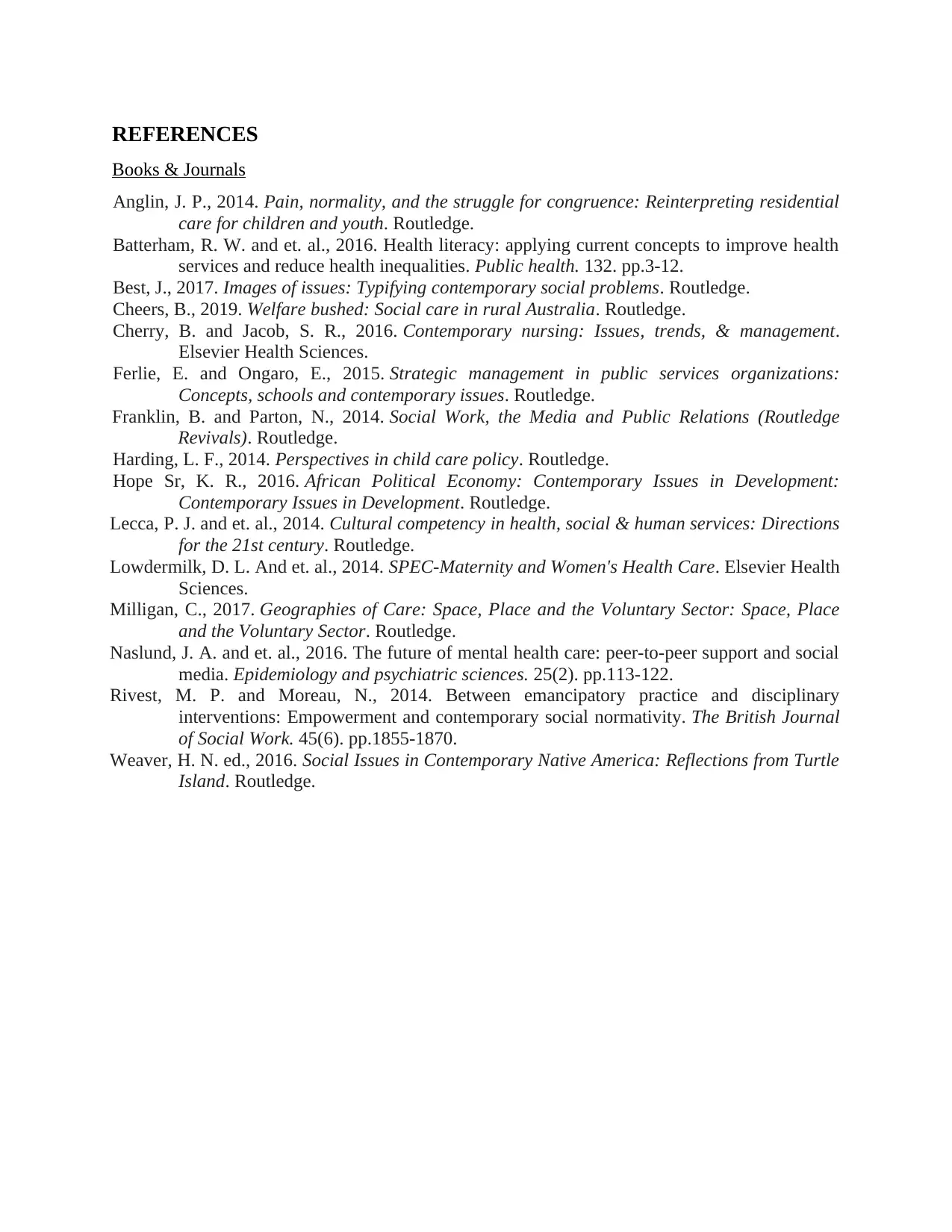
REFERENCES
Books & Journals
Anglin, J. P., 2014. Pain, normality, and the struggle for congruence: Reinterpreting residential
care for children and youth. Routledge.
Batterham, R. W. and et. al., 2016. Health literacy: applying current concepts to improve health
services and reduce health inequalities. Public health. 132. pp.3-12.
Best, J., 2017. Images of issues: Typifying contemporary social problems. Routledge.
Cheers, B., 2019. Welfare bushed: Social care in rural Australia. Routledge.
Cherry, B. and Jacob, S. R., 2016. Contemporary nursing: Issues, trends, & management.
Elsevier Health Sciences.
Ferlie, E. and Ongaro, E., 2015. Strategic management in public services organizations:
Concepts, schools and contemporary issues. Routledge.
Franklin, B. and Parton, N., 2014. Social Work, the Media and Public Relations (Routledge
Revivals). Routledge.
Harding, L. F., 2014. Perspectives in child care policy. Routledge.
Hope Sr, K. R., 2016. African Political Economy: Contemporary Issues in Development:
Contemporary Issues in Development. Routledge.
Lecca, P. J. and et. al., 2014. Cultural competency in health, social & human services: Directions
for the 21st century. Routledge.
Lowdermilk, D. L. And et. al., 2014. SPEC-Maternity and Women's Health Care. Elsevier Health
Sciences.
Milligan, C., 2017. Geographies of Care: Space, Place and the Voluntary Sector: Space, Place
and the Voluntary Sector. Routledge.
Naslund, J. A. and et. al., 2016. The future of mental health care: peer-to-peer support and social
media. Epidemiology and psychiatric sciences. 25(2). pp.113-122.
Rivest, M. P. and Moreau, N., 2014. Between emancipatory practice and disciplinary
interventions: Empowerment and contemporary social normativity. The British Journal
of Social Work. 45(6). pp.1855-1870.
Weaver, H. N. ed., 2016. Social Issues in Contemporary Native America: Reflections from Turtle
Island. Routledge.
Books & Journals
Anglin, J. P., 2014. Pain, normality, and the struggle for congruence: Reinterpreting residential
care for children and youth. Routledge.
Batterham, R. W. and et. al., 2016. Health literacy: applying current concepts to improve health
services and reduce health inequalities. Public health. 132. pp.3-12.
Best, J., 2017. Images of issues: Typifying contemporary social problems. Routledge.
Cheers, B., 2019. Welfare bushed: Social care in rural Australia. Routledge.
Cherry, B. and Jacob, S. R., 2016. Contemporary nursing: Issues, trends, & management.
Elsevier Health Sciences.
Ferlie, E. and Ongaro, E., 2015. Strategic management in public services organizations:
Concepts, schools and contemporary issues. Routledge.
Franklin, B. and Parton, N., 2014. Social Work, the Media and Public Relations (Routledge
Revivals). Routledge.
Harding, L. F., 2014. Perspectives in child care policy. Routledge.
Hope Sr, K. R., 2016. African Political Economy: Contemporary Issues in Development:
Contemporary Issues in Development. Routledge.
Lecca, P. J. and et. al., 2014. Cultural competency in health, social & human services: Directions
for the 21st century. Routledge.
Lowdermilk, D. L. And et. al., 2014. SPEC-Maternity and Women's Health Care. Elsevier Health
Sciences.
Milligan, C., 2017. Geographies of Care: Space, Place and the Voluntary Sector: Space, Place
and the Voluntary Sector. Routledge.
Naslund, J. A. and et. al., 2016. The future of mental health care: peer-to-peer support and social
media. Epidemiology and psychiatric sciences. 25(2). pp.113-122.
Rivest, M. P. and Moreau, N., 2014. Between emancipatory practice and disciplinary
interventions: Empowerment and contemporary social normativity. The British Journal
of Social Work. 45(6). pp.1855-1870.
Weaver, H. N. ed., 2016. Social Issues in Contemporary Native America: Reflections from Turtle
Island. Routledge.
1 out of 11
Related Documents
Your All-in-One AI-Powered Toolkit for Academic Success.
+13062052269
info@desklib.com
Available 24*7 on WhatsApp / Email
![[object Object]](/_next/static/media/star-bottom.7253800d.svg)
Unlock your academic potential
Copyright © 2020–2026 A2Z Services. All Rights Reserved. Developed and managed by ZUCOL.





